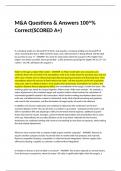Exam (elaborations)
M&A Questions & Answers 100^% Correct(SCORED A+)
- Course
- Institution
If a company trades at a forward PE of 20.0x, and acquires a company trading at a forward PE of 13.0x. Assuming the deal is 100% stock-for-stock, and a 20% premium is being offered, will the deal be accretive in year 1? - ANSWER Yes: stock for stock deals where the acquirer's PE is higher than tar...
[Show more]



